October, 2008
Our invitation to Russia came from one of our International Psychotherapy Institute Fellows, Patrizia Pallaro, who returned from teaching in Moscow to inform us that two of our books were being translated. Did we know about that? Several months of discussion later, royalties and permissions arranged in medias res, Lena Spirkina from Moscow contacted us to say she had heard that we were interested in coming to Moscow to teach, and that she would be glad to arrange that. Negotiations about the conditions and time of year followed, and a year later we flew to Moscow for a five day visit with another few days in St. Petersburg as tourists.
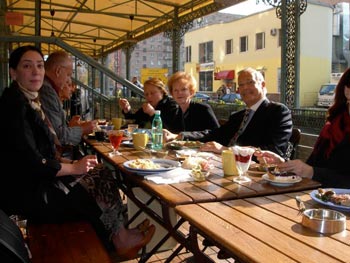
Lena’s daughter-in-law, Anna, met us at the airport after 20 hours of uneventful travel, and drove us to the hotel through rush hour traffic, which exists throughout most of the day and into the late evening. The dense traffic that has mushroomed in the last ten years stayed with us throughout our stay. Moscow is a grey city of 15 million with wide streets and communist architecture that includes 7 nearly identical Stalin Palaces scattered through the city. They hold functions as diverse as a government ministry, Moscow State University, and an apartment building formerly for the elite.
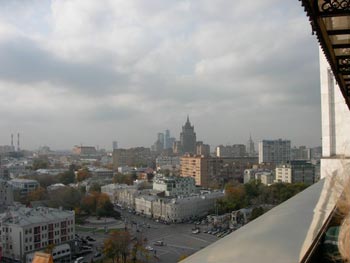
On our second night Alina Krivstova, a charming, generous young woman whom we had met a few weeks earlier in Washington, took us to the opulent designer jewelry store “Alena Gorchakova,” in which she worked, where Russian-style pieces of designer jewelry, with prices perhaps exceeding any store we had ever entered, were displayed. She then took us to a restaurant in the fashion of the elite communist 1950’s, and on a night tour by car of Moscow. It was the most beautiful view of Moscow we saw during our stay.
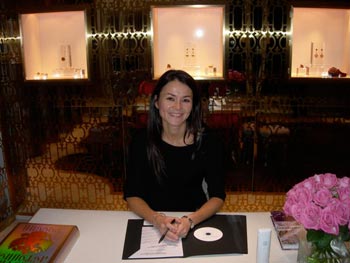
By day the same views of the city, although dotted by generous parks and two rivers, were a depressed grey, giving the impression of a traumatized populace who seemed never to look one in the eye. The buildings are grey stone and of a monumental scale that feels humanly diminishing. In all, we spent a total of three days as tourists, in palaces, famous churches and, most stunningly, in the Tretyakov Gallery – featuring an impressive and interesting collection of XI-XX century Russian art that had been given to the country. There are still more galleries we did not see, including the famous Pushkin Gallery, but we went to a wonderful opera concert — first row in an elegant hall — and ate in ethnic restaurants like our favorite, a Ukrainian restaurant decorated as a country inn. Borsht is wonderful everywhere.
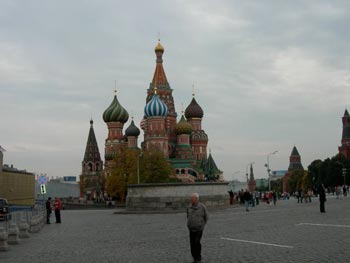
Lena Spirkina and her colleagues were warm and gracious, helping us recover quickly from our doubts about what we had gotten ourselves into. They have been taught generously by IPA members from the US, including the couple Yulia Aleshina and Pasha Snejnevski who emigrated to Washington and worked with me at the Washington School of Psychiatry while beginning their analytic training more than 15 years ago.
Psychotherapy in Russia began with a group of psychologists that included Yulia and Pasha from Moscow State University. This group also included a seminal teacher who, having no access to Western psychoanalysis, had to make it up for himself and his students. Then a few, like Yulia and Pasha, got training in the West or even in Eastern Europe as it opened up after the Soviet Union dissolved in 1990 and psychoanalysis and analytic therapy were no longer forbidden.
Lena Spirkina, then in her 20’s, was among a small group of people invited to California in the 1980s — none of them as yet trained as psychotherapists — who were given red carpet treatment and a blitz of exposures to widely varying kinds of therapy. On her return, she decided that Russia had to have training, and she has over the years founded and developed the Moscow Institute for Psychoanalytic Psychotherapy. For a long time, the institute brought in teachers from overseas – many from the US, but also Europe, and then from the IPA who used shuttle analysis and seminars in Moscow to train enough people that there are now an IPA Study Group and local training analysts. But Lena is the heart and soul of the psychotherapy training. Although it is rigorously analytic, having evolved from being widely and tentatively eclectic, it has to teach basic academic psychology in order to receive state authentication. She is able to rent space in the state Institute of Psychology, but pays for that, and all the students pay tuition to study in this completely private institution. We developed an immediate and sustained admiration for her, her faculty and the students who sacrifice so much to learn what we, in our relative freedom and economic well-being, take for granted.
But there is really a more compelling case for this group of colleagues: Russia is a traumatized society. This generation of teachers and students come from families that grew up in the most traumatizing uncertainty, with parents under constant threat of being denounced, constantly on guard. Every family was either in fear of being undone or imprisoned, or among those doing the spying – traumatic in both directions. So both the therapists and the patients share this history in their social unconscious. Lena told us something of the dramatic and pervasive trauma to her family, spread through the generations, which I will not describe here because it is her story and I hope she will come to one of our conferences to tell it herself. But it makes clear that Russia itself has centuries of trauma, from the enslavement of the serfs, to the struggle to form a middle class that was abruptly cut off by the 1917 revolution, to the 70 years of fear, imprisonment and the death of 30 million people under Stalin. And then suddenly there was a shift. Nevertheless, while we were there, there were images of Putin on TV on his birthday, felling his karate teacher and marching through the forest bare-chested with a gun. It feels as though Russia is moving rapidly back towards the dictatorship that has been its state since the first unification under the Czars and that continued under communism. But this time there is a wealthy class, and a thriving middle class with education, and a sense of more political freedom to speak — at least privately — than in China.
So psychotherapy is a new boom industry, and Lena’s colleagues are hungry to know. They have formed a Society for Psychoanalytic Psychotherapy that forms the base on which formal analytic training should rest, and which offers to spread psychoanalytic application further than the limited reach that formal psychoanalysis can do by itself. Our brand of object relations theory, with its applications to family, couple and sex therapy – and even child therapy – is relatively new to them, especially in analytic form. So they are eager to learn.
Housed in the same institute building is the publisher of Russian psychoanalytic books, Victor Beloposky. A wiry, energetic white haired man, he bounced from his desk to greet us. Then we had an hour’s meeting trying to determine the best Russian translations of some of the key object relations terms. His editor and a translator are working on the third of our books that they will publish. After one particularly protracted discussion on the concept of psychological holding, the editor suddenly felt she understood and dashed from the room to get it down.
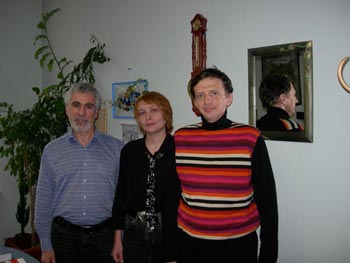
St. Petersburg is a stunning city! Palaces and broad beautiful vistas are surrounded by canals, rivers and the sea everywhere. The battleship Potemkin is now a museum docked on a quay. The buildings are painted bright colors, while the palaces are modeled on the 18th century European ones Peter the Great took as his model. Unlike Moscow, energetic people on the street look you in the eye. The depression lifts and even here, near the Arctic Circle on a chilly, bright October day, everything seems cheerful. The art in the Hermitage – mostly Russian and European – is stunning, although the Impressionist collection is much less extensive than I had imagined. But the palaces in the city and surrounding smaller towns, built by generations of Czars and their families in the 18th and 19th centuries, are magnificent. The Germans occupied the towns approaching St. Petersburg and almost completely destroyed the palaces, but they never made it into the city because of the heroism and persistence of the army and citizens over a three year siege. The palaces have been rebuilt from their gutting by the Germans with private and volunteer efforts and now shine as a tribute to the human spirit.
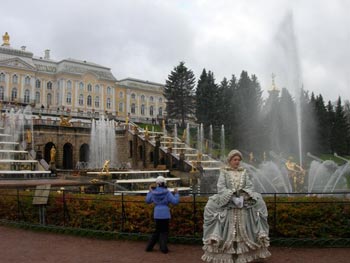
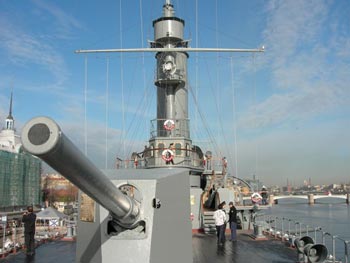
We met more briefly with a group of child analytic clinicians in St. Petersburg. They have been helped with psychotherapy and psychoanalytic training by the same Western and Eastern European teachers as in Moscow, but there are fewer of them in this smaller city. Warm and generous, Misha Yarish and his child therapy colleagues asked us to tell them about the rudiments of applying object relations to family and couple therapy, and concluded with the hope we would some day return to do more.
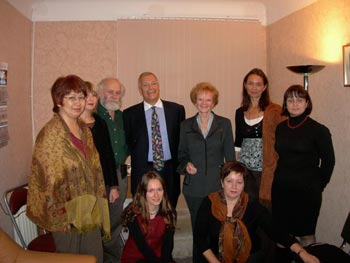
Russia has a small but rapidly growing number of colleagues who desperately want to know what we know, how we practice, how we work with patients. Like China, it has an enormous, long-standing history of trauma, although very different in detail. The number of informed colleagues may be smaller than in China, but they are better-educated and more organized in passing on and enlarging a foundation for future growth and work. They are eager for more help, making good on every opportunity, and in their resilience, their survival of a hundred years of trauma, they have a great deal to teach us in return.

